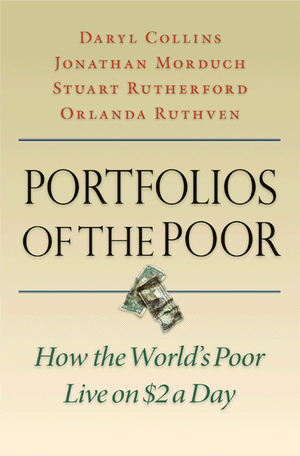( – promoted by mishima)
 The topic below was originally posted on my blog, the Intrepid Liberal Journal.
The topic below was originally posted on my blog, the Intrepid Liberal Journal.
According to the World Bank, almost forty percent of humanity lives on a daily income of less than two dollars per day. Another 1.1 billion scrape by on less than one dollar per day.
How can anyone possibly survive or raise a family with such a meager income? In New York City, two dollars per day won’t even cover my daily Brooklyn/Manhattan round-trip subway commute. Yet billions of low skilled people put food on the table, educate their children, grapple with unexpected emergencies and even save money.
In Portfolios of the Poor: How the World’s Poor Live On $2 a Day, Darryl Collins, Jonathan Morduch, Stuart Rutherford and Orlanda Ruthven, compiled yearlong “financial diaries,” of villagers and slum dwellers in Bangladesh, India and South Africa. The diaries track penny by penny, how specific households manage their money with sophistication and resourcefulness. Recently published by Princeton University Press, Portfolios of the Poor, presents revealing data in an accessible seven chapters and 184 pages of text. The text is supported with an additional eighty plus pages of appendices, data tables and notes illustrating “the story behind the portfolios.”
In a tour de force of primary research, the authors report that the world’s poorest do not live hand to mouth and desperately spend what they earn just to keep from drowning. Instead, they utilize financial tools, rely on “informal” networks through relatives and neighbors and navigate perils such as medical calamities and political strife. Their stories are both inspiring as well as heartbreaking.
Although the world’s poorest are far more adept at financial management then previously understood, they’re confronted with what the authors describe as the “triple whammy”:
1. Low income.
2. Irregularity of income.
3. Unpredictability about when they will earn income.
Hence, the authors assertively advocate for microfinancing as a means of empowering the world’s poorest with more secure and convenient instruments to access and manage money. Microfinancing is financial services for low income clients in the world’s poorest countries who are self-employed or operating their own businesses.
The authors argue in their book that microfinancing should also be extended to address the needs of exceptionally low-income wage earners as well. It is their contention that poor people in the countries they researched demonstrate on a daily basis that they are responsible money managers and would also be reliable clients of microfinancing services.
One of the authors, Jonathan Morduch, is a New York University (“NYU”) professor of economics as well as a managing director of the Financial Access Initiative – a consortium of researchers at NYU, Harvard, Yale, and Innovations for Poverty Action. Morduch, agreed to a telephone podcast interview with me about the book and our conversation was just under twenty-six minutes.
Among the topics covered was how his team earned the confidence of the people interviewed, the informal market tools utilized by the world’s poorest in Bangladesh, India and South Africa and why he’s a proponent of extending microfinancing to the world’s poorest wage earners.
Please refer to the flash media player below.
This interview can also be accessed at no cost via the Itunes Store by searching for either the “Intrepid Liberal Journal” or “Robert Ellman.

6 comments
Skip to comment form
Author
and my thanks to anyone able to take the time to listen.
people to turn their heads and ignore this. Thank you for publicizing this.
of this video is that, much as we are all going to have to do the people rely on community, to function economically. Economists most, create dependence on the very systems that look at debt a a way to make more money. These people may be poor but they have much in common with us. The three whammies described are mine, I own a small business and operate, under the same conditions as they do, our income and expenditures may be mathematically more but the systems of capitalism that run the financial system, and global/corporate capitalism offer me nothing as I do not meet their criteria any more then a ricochet driver in Bangladesh. I have no access to any of the institutions mentioned.
Bits and pieces I save get invested in myself and community not some freaken corporate stock. Entrepreneurship is sometimes a necessity as wages and corporations (including the financial industry) are not by their nature interested in helping people improve their lives. They are interested in making money. Micro financing sounds great but the question I ask is who is going to finance these people? The World Bank, The corporate governments, the free market pirates? Me I am sticking with community, My money is in a community bank and any investing or savings I do will not go to those entities that view progress as amassing obscene amounts of money and stuff. guess I’m a socialist. You got to question economics that all use the capitalistic model as the only way to lift all boats. The free market costs to much for most to pay the vig.